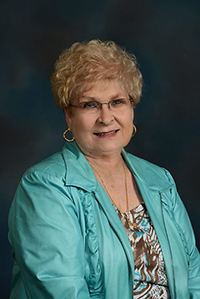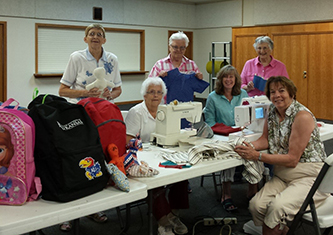Love Your Heart: Tips for a Healthy, Happy Lifestyle
February 12, 2016

As the number one killer of women, it’s important to know the steps you can take to help prevent heart disease. That’s why this February during Heart Health Month, we’ve reached out to GFWC clubwomen with experience in the health care industry, and asked them how women can protect their hearts and live a healthy lifestyle. Check out the following tips for ways you can take control of your health, starting today.
Follow a Healthy Diet
Tricia Wagman, a registered nurse who works as a patient educator and certified diabetes educator, says that healthy eating is all about planning. She suggests making a list before going to the store to ensure your diet is a balance of calories from foods such as fruits and vegetables, whole grains, low-fat dairy products, skinless chicken and fish, nuts and legumes, and canola, olive, and grape seed oil. She also advises adding beans, eggs, and unsalted nuts as other protein options.
A good place to start is fresh fruits and vegetables. Since salt should be limited, consider picking up some fresh herbs in the produce section to add flavor, Tricia said.
“Think of adding color and make a rainbow of veggies on your plate,” she said. “Fresh or frozen vegetables are a better option. If canned vegetables and fruits are your only option, look for ones packed in water without added sugars, fats or salt.”
When cooking meats and fish, Tricia advises grilling, broiling, or baking the meat. Frying should be avoided. A healthy diet also includes plenty of water.
“Limit juices and soda in your meal plan,” Tricia said.
Portion sizes should also be considered, Tricia said, so be sure to read food labels and be aware of serving sizes when shopping.
Exercise Every Day
Exercise is key to maintaining a healthy weight and preventing heart disease. But that doesn’t mean you have to buy a gym membership and put on the spandex, Tricia said.
“Start out simple with adding steps to your day. The goal is 10,000 steps a day,” she said. “Get up every hour at work in your office and walk around to get the blood moving. Go for a walk at lunch or take the dog for a walk after work. Get your children up and moving and walk or push them in the stroller to the park. Challenge the children to play a game of Wii sports. Put on some music and dance around the house.”
Walking can also help with stress, depression, and anxiety, said Tammie McCoy, who has been a nurse since 1985.
“Walking is great exercise and is free. Walk at least 30 minutes most days for the best benefit,” she said.
Limit Caffeine and Alcohol Intake
Women should avoid drinking more than one glass of alcohol per day.
“If you drink alcohol, drink red wine,” said Barbara Whitaker, Advanced Practice Registered Nurse and Certified Registered Nurse Anesthetist. “Red wine is considered to have the most heart-healthy resveratrol. However, studies show it might be other lifestyle factors that are important. It is known that more than a glass or two a day can lead to other health issues. If you don’t drink, don’t start just for the resveratrol.”
Stop Smoking
“If you smoke, stop,” Barbara said. “This includes e-cigarettes. If you use a nicotine patch or gum, wean them as soon as possible.”
Some studies suggest that quitting smoking can decrease the risk of cardiovascular disease by 50 percent, Tammie said.
Get regular check-ups and know your numbers
According to Celene Post, a registered nurse, you should be aware of your blood pressure, fasting blood sugar, cholesterol (both good and bad), and body mass index (BMI.)
“Talk to your healthcare provider – no questions are stupid!” she said. “Know your numbers, treat your risk, and you will be on your way to a healthier lifestyle!”
It’s important to keep diabetes under control, Barbara said. “I see the results of poor control in the vascular lab every day,” she said. “It’s not pretty.”
Reduce Stress
Reading a cozy mystery, meditating, getting a message, relaxing, watching a comedy, or doing a craft are just some ideas Barbara gives for reducing stress.
“Incorporate ‘me’ time in your day,” she said.
Know the Signs of a Heart Attack
According to Jane Carver, a Certified Emergency Nurse, there is no age limit on heart attacks, Women as young as 30 can have an attack.
“Women die sitting at home,” Jane said. “Any emergency room would prefer that you come in and not have a heart attack than have a heart attack at home, waiting to see if you get better.”
Jane advises that women experiencing the warning symptoms listed below should call their doctor, especially if the feelings are new, worse, unexplained, or they have other heart disease risk factors. If they’re severe, or you have any signs of an impending heart attack, call 911.
Symptoms include:
Shortness of breath: Often the first symptom.
Unusual fatigue: Overwhelming exhaustion, too tired to do anything
Digestive changes: Terrible heartburn with nausea.
Weakness: No strength, like having the flu.
Chest or upper back discomfort: May or may not be crushing pain.
Symptoms come and go, but may increase in intensity and number as the attack nears. Women may have six or more different symptoms that become more intense and pile on top of one another. Jane reports that of the hundreds of women heart attack survivors, 95 percent of the women suspected something was wrong in the months leading up to their attack.
Visit The Heart Truth website for more information on heart disease and women.
About the Authors
Jane Carver is a Certified Emergency Nurse with over 30 years of experience in the emergency room. She currently serves on the GFWC Credentials Committee.
Tammie McCoy has been an active member of the GFWC Mississippi Pontotoc Woman’s Club since 1997 and currently serves on the GFWC Communications and Public Relations Committee. She has been a nurse since 1985. She has worked in staff and leadership nursing positions in home health, flight nursing, and emergency nursing. Tammie has been a member of the Bachelor of Science in Nursing Program Faculty at Mississippi University for Women since 1999 and has been department chair since 2007.
Celene Post will mark 44 years of nursing in July. Her nursing experience includes hospital and nursing homes, hospice, marketing, and home care. She currently works in health management and serves on the GFWC 125th Anniversary Celebration Committee.
Barbara Whitaker currently serves as GFWC Parliamentarian. She is an Advanced Practice Registered Nurse and Certified Registered Nurse Anesthetist (APRN, CRNA) with over 30 years of experience in practice with United Anesthesia, Inc. at West Virginia University Medicine Camden Clark Medical Center in Parkersburg, West Virginia.
Tricia Wagman is a registered nurse who graduated from Boston College and worked at Beth Israel Hospital in Boston on a cardiac and oncology unit. She now lives in Maryland and works at Carroll Hospital and LifeBridge Health Center as the patient educator and certified diabetes educator. Tricia is a member of the GFWC Junior Woman’s Club of Westminster and serves as Special Assistant to GFWC International President Babs J. Condon.
Blog
Featured Member

Barbara Winingham
For more than 60 years, GFWC clubwoman and 2020 Jennie Award Winner Barbara Winingham has been making a difference in her community by volunteering with GFWC Texas and GFWC Amity Club of Bowie.
Success For Survivors Scholarship
Each year, GFWC awards scholarships to help intimate partner abuse survivors obtain a post-secondary education that offers a chance to reshape their future by securing employment and gaining personal independence.
Featured Club

GFWC Towanda Nokomis
With eight members, the GFWC Towanda Nokomis is proving that a small group of committed citizens can, in fact, change the world.


